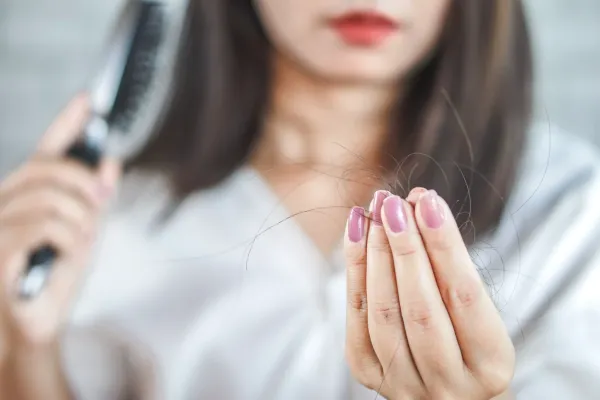Postpartum Hair Loss: My Journey, And How New Moms Can Cope
admin | September 5, 2025 9:22 PM CST

If you think childbirth is hard, let me tell you that postpartum can be even tougher. Amid all the challenges of caring for a newborn and adjusting to a new life, postpartum hair loss can significantly add to the stress.
Hair loss, regardless of the reason or the stage of life, can be highly distressing, and facing it during the postpartum phase - when everything is already overwhelming - can feel traumatic.
Before delving into the technical details, let me give you a glimpse of what postpartum hair loss really looks like. After childbirth, you will continue taking your prenatal vitamins. Your doctor will typically advise you to gradually stop iron supplements after 1-2 months, while calcium is often prescribed for as long as you choose to breastfeed. During the initial two months, you might not experience any hair fall since you're on these supplements. However, things start to change between the third and the fourth month. You may notice significant hair loss, much more than you've ever experienced before. From your pillow to your baby's toes, you'll find strands of hair tangled everywhere. Most women find that pregnancy makes their hair thicker and experience hair thinning during postpartum. In my case, I experienced hair fall during pregnancy and then (again) during postpartum.
Postpartum hair loss is not just about losing hair, it takes a toll on your mental health. When you are already sleep deprived, your body doesn't feel the same, you fail to identify yourself as a person and experience shifts in every aspect of life, hair loss can intensify the emotional burden.
With the arrival of the newborn, my room became a mess with baby clothes, diaper bags, toys, dry sheets, wet wipes, and baby medicines - all accompanied by my hair strands in every corner. From my firsthand experience, I would recommend that to-be mothers should be counselled well to cope with this stage by explaining the causes of postpartum hair loss and providing mental support.
Now, let's explore the science behind postpartum hair loss.
Postpartum hair loss is a common phenomenon and can be distressing for new mothers.
During pregnancy, your hormones change dramatically. Along with hCG (human chorionic gonadotropin), pregnancy also causes several other hormone levels to rise, including estrogen, progesterone, oxytocin, and prolactin. Your blood volume also increases to as much as 50 percent greater volume than normal.
Immediately after your baby is born, most of these hormone levels drop quickly, including estrogen and progesterone. Besides prolactin, these hormones will be almost back to normal levels within 24 hours after birth. Similarly, your blood volume also decreases gradually.
This drop in hormone levels makes your hair enter the shedding phase or the resting phase (telogen).
"Throughout pregnancy, high levels of estrogen cause hair to remain in the growth phase longer than normal. This is why many women have noticed their hair is thicker or fuller during pregnancy. After delivery, hormone levels drop (particularly estrogen) and many hair follicles shed at the same time (telogen effluvium)," explained Dr. Aastha Gupta, Senior IVF consultant and infertility expert, Obstetrics & Gynaecology at Delhi IVF.
Other factors:
- Physical stress:
- Nutritional deficiencies:
- Fatigue and stress:
READ NEXT
-
Meet Bollywood’s greatest singer, who got inspired by a fakir in Lahore, was paid only Rs 75 in his initial days, later became a legend, his first wife left him after.., his name is.

-
The Bengal Files movie review: Vivek Agnihotri’s heart-wrenching, political drama hits hard left, right and centre

-
A new book recounts the legends behind the Thirunakkara Mahadevar Temple in Kerala's Kottayam

-
England star didn't want to see Thomas Tuchel before boss laughed in his face

-
Nature's wrath in Jammu: 283 houses damaged, 950 evacuated in Ramban
